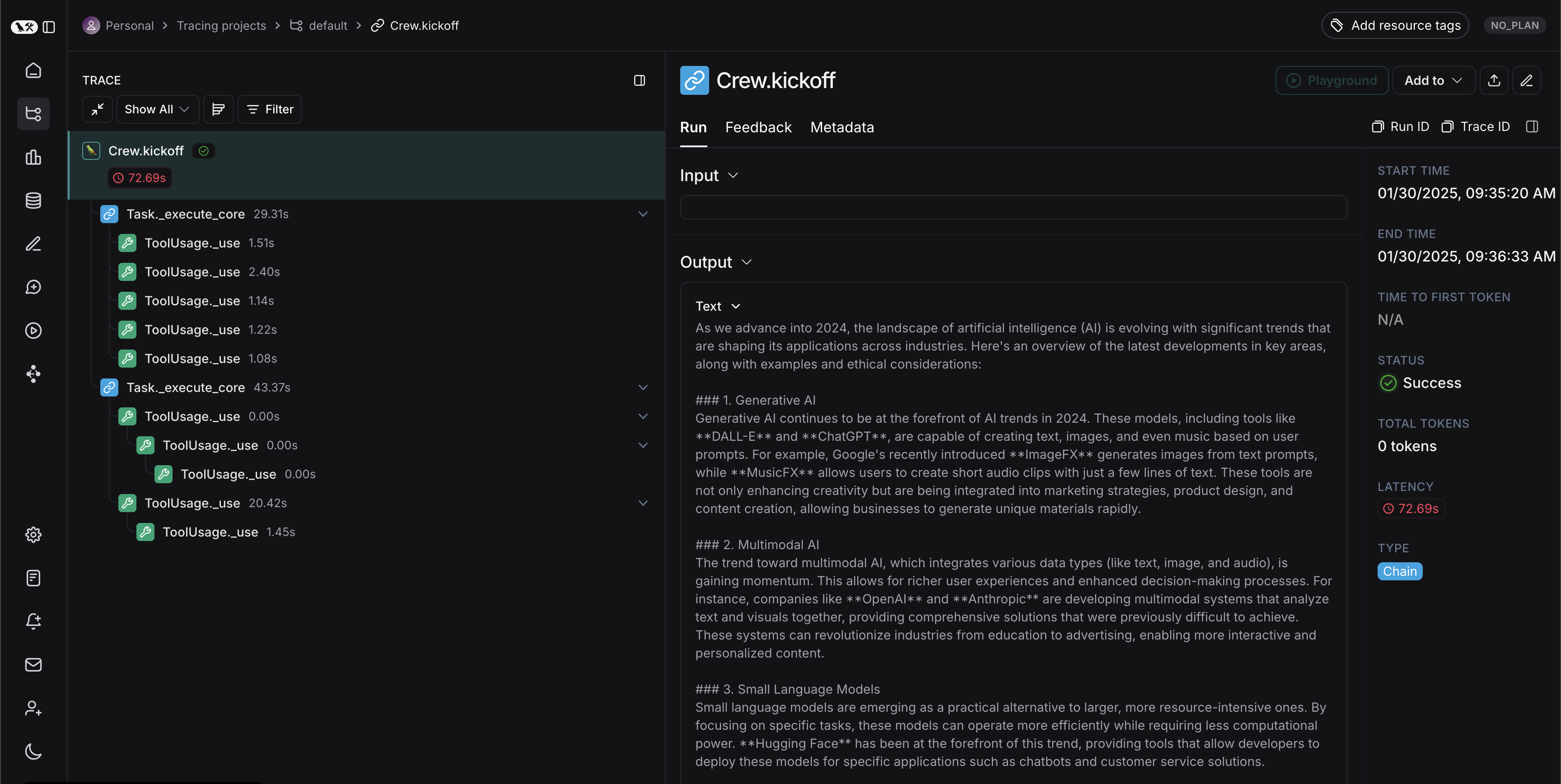Trace with OpenTelemetry
LangSmith can accept traces from OpenTelemetry based clients. This guide will walk through examples on how to achieve this.
Logging Traces with a basic OpenTelemetry client
This first section covers how to use a standard OpenTelemetry client to log traces to LangSmith.
1. Installation
Install the OpenTelemetry SDK, OpenTelemetry exporter packages, as well as the OpenAI package:
pip install openai
pip install opentelemetry-sdk
pip install opentelemetry-exporter-otlp
2. Configure your environment
Setup environment variables for the endpoint, substitute your specific values:
OTEL_EXPORTER_OTLP_ENDPOINT=https://api.smith.langchain.com/otel
OTEL_EXPORTER_OTLP_HEADERS="x-api-key=<your langsmith api key>"
Optional: Specify a custom project name other than "default"
OTEL_EXPORTER_OTLP_ENDPOINT=https://api.smith.langchain.com/otel
OTEL_EXPORTER_OTLP_HEADERS="x-api-key=<your langsmith api key>,Langsmith-Project=<project name>"
3. Log a trace
This code sets up an OTEL tracer and exporter that will send traces to LangSmith. It then calls OpenAI and sends the required OpenTelemetry attributes.
from openai import OpenAI
from opentelemetry import trace
from opentelemetry.sdk.trace import TracerProvider
from opentelemetry.sdk.trace.export import (
BatchSpanProcessor,
)
from opentelemetry.exporter.otlp.proto.http.trace_exporter import OTLPSpanExporter
client = OpenAI(api_key=os.getenv("OPENAI_API_KEY"))
otlp_exporter = OTLPSpanExporter(
timeout=10,
)
trace.set_tracer_provider(TracerProvider())
trace.get_tracer_provider().add_span_processor(
BatchSpanProcessor(otlp_exporter)
)
tracer = trace.get_tracer(__name__)
def call_openai():
model = "gpt-4o-mini"
with tracer.start_as_current_span("call_open_ai") as span:
span.set_attribute("langsmith.span.kind", "LLM")
span.set_attribute("langsmith.metadata.user_id", "user_123")
span.set_attribute("gen_ai.system", "OpenAI")
span.set_attribute("gen_ai.request.model", model)
span.set_attribute("llm.request.type", "chat")
messages = [
{"role": "system", "content": "You are a helpful assistant."},
{
"role": "user",
"content": "Write a haiku about recursion in programming."
}
]
for i, message in enumerate(messages):
span.set_attribute(f"gen_ai.prompt.{i}.content", str(message["content"]))
span.set_attribute(f"gen_ai.prompt.{i}.role", str(message["role"]))
completion = client.chat.completions.create(
model=model,
messages=messages
)
span.set_attribute("gen_ai.response.model", completion.model)
span.set_attribute("gen_ai.completion.0.content", str(completion.choices[0].message.content))
span.set_attribute("gen_ai.completion.0.role", "assistant")
span.set_attribute("gen_ai.usage.prompt_tokens", completion.usage.prompt_tokens)
span.set_attribute("gen_ai.usage.completion_tokens", completion.usage.completion_tokens)
span.set_attribute("gen_ai.usage.total_tokens", completion.usage.total_tokens)
return completion.choices[0].message
if __name__ == "__main__":
call_openai()
You should see a trace in your LangSmith dashboard like this one.
Logging Traces with the Traceloop SDK
The Traceloop SDK is an OpenTelemetry compatible SDK that covers a range of models, vector databases and frameworks. If there are integrations that you are interested in instrumenting that are covered by this SDK, you can use this SDK with OpenTelemetry to log traces to LangSmith.
To see what integrations are supported by the Traceloop SDK, see the Traceloop SDK documentation.
To get started, follow these steps:
1. Installation
pip install traceloop-sdk
pip install openai
2. Configure your environment
Setup environment variables:
TRACELOOP_BASE_URL=https://api.smith.langchain.com/otel
TRACELOOP_HEADERS=x-api-key=<your_langsmith_api_key>
Optional: Specify a custom project name other than "default"
TRACELOOP_HEADERS=x-api-key=<your_langsmith_api_key>,Langsmith-Project=<langsmith_project_name>
3. Initialize the SDK
To use the SDK, you need to initialize it before logging traces:
from traceloop.sdk import Traceloop
Traceloop.init()
4. Log a trace
Here is a complete example using an OpenAI chat completion:
import os
from openai import OpenAI
from traceloop.sdk import Traceloop
client = OpenAI(api_key=os.getenv("OPENAI_API_KEY"))
Traceloop.init()
completion = client.chat.completions.create(
model="gpt-4o-mini",
messages=[
{"role": "system", "content": "You are a helpful assistant."},
{
"role": "user",
"content": "Write a haiku about recursion in programming."
}
]
)
print(completion.choices[0].message)
You should see a trace in your LangSmith dashboard like this one.
Logging Traces from other frameworks
With OpenTelemetry, you can log traces from multiple other frameworks to LangSmith. Below is an example of tracing CrewAI to LangSmith, you can find a full list of supported frameworks here. To make this example work with other frameworks, you just need to change the instrumentor to match the framework.
1. Installation
First, install the required packages:
pip install -qU arize-phoenix-otel openinference-instrumentation-crewai crewai crewai-tools
2. Configure your environment
Next, set the following environment variables:
OPENAI_API_KEY=<your_openai_api_key>
SERPER_API_KEY=<your_serper_api_key>
3. Set up the instrumentor
Before running any application code let's set up our instrumentor (you can replace this with any of the frameworks supported here)
from opentelemetry.sdk.trace import TracerProvider
from opentelemetry.sdk.trace.export import BatchSpanProcessor
from opentelemetry.exporter.otlp.proto.http.trace_exporter import OTLPSpanExporter
# Add LangSmith API Key for tracing
LANGSMITH_API_KEY = "YOUR_API_KEY"
# Set the endpoint for OTEL collection
ENDPOINT = "https://api.smith.langchain.com/otel/v1/traces"
# Select the project to trace to
LANGSMITH_PROJECT = "YOUR_PROJECT_NAME"
# Create the OTLP exporter
otlp_exporter = OTLPSpanExporter(
endpoint=ENDPOINT,
headers={"x-api-key": LANGSMITH_API_KEY, "Langsmith-Project": LANGSMITH_PROJECT}
)
# Set up the trace provider
provider = TracerProvider()
processor = BatchSpanProcessor(otlp_exporter)
provider.add_span_processor(processor)
# Now instrument CrewAI
from openinference.instrumentation.crewai import CrewAIInstrumentor
CrewAIInstrumentor().instrument(tracer_provider=provider)
4. Log a trace
Now, you can run a CrewAI workflow and the trace will automatically be logged to LangSmith
from crewai import Agent, Task, Crew, Process
from crewai_tools import SerperDevTool
search_tool = SerperDevTool()
# Define your agents with roles and goals
researcher = Agent(
role='Senior Research Analyst',
goal='Uncover cutting-edge developments in AI and data science',
backstory="""You work at a leading tech think tank.
Your expertise lies in identifying emerging trends.
You have a knack for dissecting complex data and presenting actionable insights.""",
verbose=True,
allow_delegation=False,
# You can pass an optional llm attribute specifying what model you wanna use.
# llm=ChatOpenAI(model_name="gpt-3.5", temperature=0.7),
tools=[search_tool]
)
writer = Agent(
role='Tech Content Strategist',
goal='Craft compelling content on tech advancements',
backstory="""You are a renowned Content Strategist, known for your insightful and engaging articles.
You transform complex concepts into compelling narratives.""",
verbose=True,
allow_delegation=True
)
# Create tasks for your agents
task1 = Task(
description="""Conduct a comprehensive analysis of the latest advancements in AI in 2024.
Identify key trends, breakthrough technologies, and potential industry impacts.""",
expected_output="Full analysis report in bullet points",
agent=researcher
)
task2 = Task(
description="""Using the insights provided, develop an engaging blog
post that highlights the most significant AI advancements.
Your post should be informative yet accessible, catering to a tech-savvy audience.
Make it sound cool, avoid complex words so it doesn't sound like AI.""",
expected_output="Full blog post of at least 4 paragraphs",
agent=writer
)
# Instantiate your crew with a sequential process
crew = Crew(
agents=[researcher, writer],
tasks=[task1, task2],
verbose= False,
process = Process.sequential
)
# Get your crew to work!
result = crew.kickoff()
print("######################")
print(result)
You should see a trace in your LangSmith project that looks like this:
